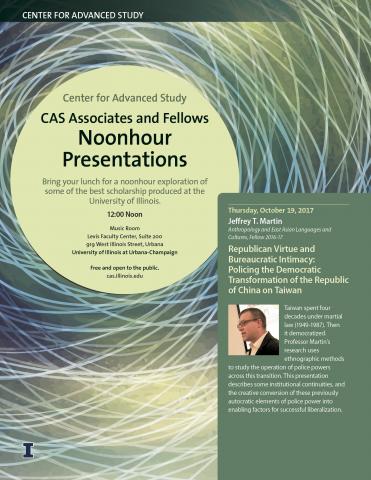Republican Virtue and Bureaucratic Intimacy: Policing the Democratic Transformation of the Republic of China on Taiwan
Center for Advanced Study
Levis Faculty Center--Music Room (208)
919 W. Illinois
Taiwan spent four decades under martial law (1949-1987). Then it democratized. Professor Martin's research uses ethnographic methods to study the operation of police powers across this democratic transition. Under dictatorship, civil policing was organized as a political intelligence operation. Neighborhood patrolmen were responsible for maintaining political dossiers on individual residents of their jurisdiction. This was a system of policing organized by an idea of modern policing which focused on qualities of character (rather than, say, legally guaranteed rights). The political dossiers were thrown out with the end of martial law, along with the erstwhile party-state’s revolutionary agenda. But elements of the policing infrastructure remained. This talk focuses on one such element: the hukou, or population registry. Professor Martin argues that institutional continuity in the police registry has preserved an idea of policing as a project of cultivating “republican virtue” (gongde). However, where autocratic government used police status as an instrument for imposing state-approved virtues, democracy has repurposed the registry-defined nexus of police-citizen relationships into an arena where republican virtues afford leverage to grass-roots counterpowers working against state authority.
Departments of Anthropology and East Asian Languages & Cultures

